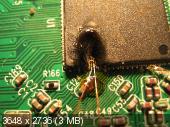Hello everyone,
I just wanted to share a successful OpenWrt installation story:
I have recently bought TP-Link TL-WR841ND v8.1 and immediately decided to try OpenWrt on it. I have used the Attitude Adjustment 12.09 RC2 version of the OpenWrt image for TP-Link TL-WR841N v8.x. In particular, I have used the squashfs image for OpenWrt installation over a stock TP-Link (factory) firmware (i.e. this one). I simply used the web interface of the stock firmware to upload the OpenWrt image to the router. After the router rebooted, everything worked fine.
I have logged in using telnet, set up root's password, logged in using ssh, set-up public-key authentication, removed wpd-mini and hostapd-mini, installed wpa_supplicant and hostapd, logged in using web interface (LuCI), set up the wifi encryption and performed some reboots for testing. Everything seems to be working fine so far.
The real speed between WAN and wired LAN ports that I have been able to achieve is ~11,7 MB/s (93.6 Mb/s), which is pretty decent over a 100baseT / Full Duplex network. I haven't tested the maximum speed of wireless network yet, but my phone is able to download at ~4,5 MB/s (36 Mb/s), which is acceptable I think (for a phone). Still, I am curious about the real maximum speed that this little router can deliver over wifi.
Overall, I am very satisfied with OpenWrt. It is amazing how easily can it change your stock 25$ router into almost fully-featured linux box. Great work and my regards to all the developers and the entire community! I really appreciate the effort you are putting in OpenWrt!
BTW: Is there a way to disable LuCI over WAN and wifi and leave it enabled over wired LAN only? I am asking because by default, there is no SSL and it could potentially be dangerous to login using wireless network... I know I can install luci-ssl, but the thing is I do NOT want LuCI over wifi enabled. I also know that I can create some fancy iptables rules... But I was just wondering whether there is some simpler way to do it... Something like turning LuCI off for eth0 and wlan0... ?


